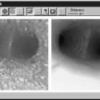Free Online Productivity Tools
i2Speak
i2Symbol
i2OCR
iTex2Img
iWeb2Print
iWeb2Shot
i2Type
iPdf2Split
iPdf2Merge
i2Bopomofo
i2Arabic
i2Style
i2Image
i2PDF
iLatex2Rtf
Sci2ools
93
Voted
ICIP
2000
IEEE
2000
IEEE
Nonlinear Distortion Correction in Endoscopic Video Images
Modern video-based endoscopes offer physicians a wide-angle field of view for minimally-invasive procedures. Unfortunately, inherent barrel distortion prevents accurate perception of range. This makes measurement and distance judgment difficult and causes difficulties in emerging applications, such as 3D medical-image registration. Such distortion also arises in other wide field-of-view camera circumstances. This paper presents a distortion-correction technique that can automatically calculate correction parameters, without precise knowledge of horizontal and vertical orientation. The method is applicable to any camera-distortion correction situation. Based on a least-squares estimation, our proposed algorithm considers line fits in both field-of-view directions and global consistency that gives the optimal image center and expansion coefficients. The method is insensitive to the initial orientation of the endoscope and provides more exhaustive field-of-view correction than previously...
Distortion Correction | Exhaustive Field-of-view Correction | Field-of-view Camera Circumstances | ICIP 2000 | Image Processing |
Related Content
| Added | 25 Oct 2009 |
| Updated | 27 Oct 2009 |
| Type | Conference |
| Year | 2000 |
| Where | ICIP |
| Authors | Chao Zhang, James P. Helferty, Geoffrey McLennan, William E. Higgins |
Comments (0)

